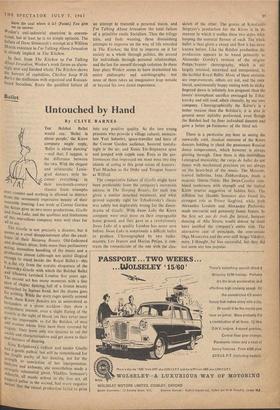Ballet
Untouched by Hand
BARNES By CLIVE
THE Bolshoi Ballet would say, 'Ballet is about people,' the Kirov company might reply, 'Ballet is about dancing' —and that, I suggest, is the difference between the two. With the elegant and aristocratic Lenin- grad dancers style be- comes everything; in their nineteenth-century classics form triumphs
over content and nothing is allowed to distract from the sensuously expressive beauty of their ensemble dancing. Last week at Covent Garden the Kirov gave us two more productions, Giselle and Swan Lake, and the qualities and limitations of this marvellous company were writ clear for all to see.
The Giselle is not precisely a disaster, but it enmes as a cruel disappointment after the excel- lence of their Sleeping Beauty. Old-fashioned and desultory decor, little more than perfunctory acting, insensitive handling of the music and a Production almost (although not quite) illogical enough to stand beside the Royal Ballet's—this is a, far cry from the ecstatic eloquence of the Lavrovsky Giselle with which the Bolshoi Ballet and Ulanova ravished London five years ago. The second act has many moments with a fine sPan of elegiac dancin,g, full of a frozen beauty untouched by human hand, but the drama goes for nothing. While the story rages quietly around them. these Kirov dancers are as uninvolved as bystanders at a street accident—they show a sYmpathetic interest, even a slight flaring of the , nostrils at the sight of blood, yet they never once give the impression, as d:d the Bolshoi, of men and women whose lives have been reversed by traged
Y. They seem only too anxious to cut the cackle and characterisation and get down to their real business of dancing.
had Kolpakova's radiant and tender Giselle nad a gentle pathos, but will be remembered for the fragile
Purity of her dancing, not for the strength or conviction of her interpretation. '
Delicate and airborne, she nevertheless made a strangely 13' substantial ghost. Viadilen Sennenov's Albrecht all manly ardour in the first act, all ha. ggard pallor in the second, had many negative virtues that the casual production failed to print
into any positive quality. As the two young peasants who provide a village cabaret, immacu- late Yuri Soloviev, space-traveller and hero of the Covent Garden audience, hovered tantalis- ingly in the air, and Xenia Ter-Stepanova spun and jumped with supple ease. Even so the per- formances that impressed me most were two tiny islands of acting in this great ocean of dancers: Yuri Miachin as the Duke and Yevgeni lvanov as Wilfred.
The comparative failure of Giselle might have been predictable from the company's enormous success in The Sleeping Beauty, for each was given a similar detached treatment, and what proved superbly right for Tchaikovsky's classic was subtly but deplorably wrong for the dance- drama of Giselle. With Swan Lake the Kirov company were once more on their impregnable home ground, and they gave us a revelationary Swan Lake of a quality London has never seen before. Swan Lake is notoriously a difficult ballet to produce. Choreographed by two ballet- masters, Lev lvanov and Marius Petipa, it con- trasts the romanticism of the one with the clas-
sicism of the other. The genius of Konstantir Sergeyev's production for the Kirov is in tbi manner in which it unifies these two styles whil,. keeping the essential flavour of each. The wholt ballet is thus given a sweep and flow it has nevei known before. Like the Bolshoi production thi production appears to be based primarily or Alexander Gorsky's revision of the origina Petipa /I vanov choreography, which is stil largely retained, unrevised and unrepentent, the faithful Royal Ballet. Many of these revision.. are improvements, others are not, and the over literal, sentimentally happy ending with its sticky. fingered dawn is infinitely less poignant than the lovers' triumphant sacrifice envisaged by Tchai kovsky and still used, albeit clumsily, by our owe company. Choreographically the Kirov's is a better version than the Bolshoi's; it is also in general more stylishly performed, even though the Bolshoi had the finer individual dancers and gave a better pc forinance of the third act.
There is a pa nicular joy here in seeing the outwardly cold, classical restraint of the Kirov dancers holding in check the passionate Russian dance temperament, which however is always glinting through. Then there is this marvellous Leningrad musicality; the corps de ballet do not dance with mechanical precision yet are always on the heart-beat of the music. The Moscow, trained ballerina, Irma Zubkovskaya, made a majestic Odette/Odile. Her Swan-Czarina com- bined tenderness with strength and the typical Kirov reserve suggestive of hidden fires. The diffident but likeable Semenov also found his strongest role as Prince Siegfried, while both Alexandre Livshitz and Alexandre Pavlovsky made mercurial and genuinely funny Jesters. In the first act pas de trots the lyrical, buoyant dancing of Alla Sizova would almost by itself have justified the company's entire visit. The alternative cast of principals, the over-ornate Olga Moiseyeva and the over-stiff Sergei Vikulov, were, I thought, far less successful, but they did not seem any less popular.


























































 Previous page
Previous page